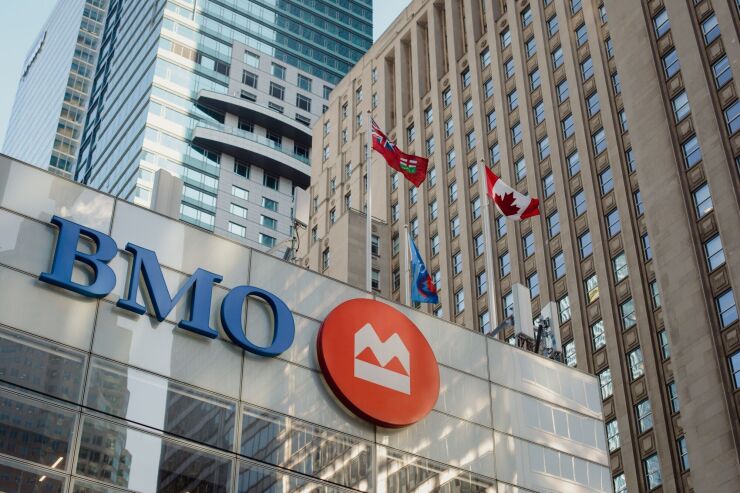
Fifteen months after
Average loans in BMO's U.S. personal and commercial banking unit fell 4% year over year during the quarter that ended April 30, BMO disclosed Wednesday. At the same time, that division's net interest margin declined by 23 basis points — a result of paying higher rates to reel in deposits from new and existing customers.
BMO's online savings product, BMO Alto, is one of the highest rate payers in the market. Its high-yield savings account is currently offering an annual percentage yield of 5.10%, while its six-month certificate of deposit is offering an APY of 5.25%, according to depositaccounts.com.
Overall, net income for the U.S. personal and commercial banking division tumbled 25.7% during the quarter. The decline, which was partially offset by lower expenses, was driven by lower revenue, which fell 6.1% year over year, as well as higher provisions for credit losses. Provisions totaled $288 million for the quarter, up from $62 million in the year-ago period.
During a conference call with analysts to discuss the quarterly results, one analyst was curious about BMO's strategy of pursuing deposit growth even as margins are being squeezed.
There is "more price competition, in general, in the U.S. marketplace," Erminia "Ernie" Johannson, BMO's group head for North American personal and commercial banking, responded. "But overall we're seeing the growth in our new customer base as well as just our real focus on full conversations with our customers to ensure that we're also migrating them proactively, in some cases to our CD products, so that we're, on the whole, keeping our deposit franchise growing."
Indeed, deposits in BMO's U.S. segment are increasing. Average deposits were $221.2 billion in U.S. dollars as of April 30, and they have risen sequentially in each of the past four quarters, the company said.
While competition is expected to persist in the U.S., "the quarterly impact on [net interest margin] should be more modest" in future quarters, Chief Financial Officer Tayfun Tuzun said on the call.
Overall, BMO executives sounded upbeat Wednesday about the growth prospects of the company's U.S. businesses, which include the Bank of the West franchise it acquired in February 2023.
BMO purchased the $105 billion-asset Bank of the West from the French banking giant BNP Paribas.
The deal,
BMO's brand recognition is "strong" in the new markets, and the company has retained more than 90% of commercial banking clients since last year's
BMO has improved its branch productivity in the new markets by 17% since Nov. 1, White said. It has also achieved "strong digital sales and digital adoption" and in March, the company achieved a record high for new business generation in both retail and commercial businesses, he added.
"While the overall environment may continue to constrain revenue growth in the near term, we continue to invest to build on our early success and capture profitable market share and create value for the long term," White said.
For the quarter, BMO reported net income of $1.9 billion in Canadian dollars, or $2 billion CAD on an adjusted basis. Adjusted results exclude items such as provisions for credit losses, a special Federal Deposit Insurance Corp. assessment fee, acquisition- and integration-related costs and charges stemming from a lawsuit associated with a predecessor bank, the company said.






